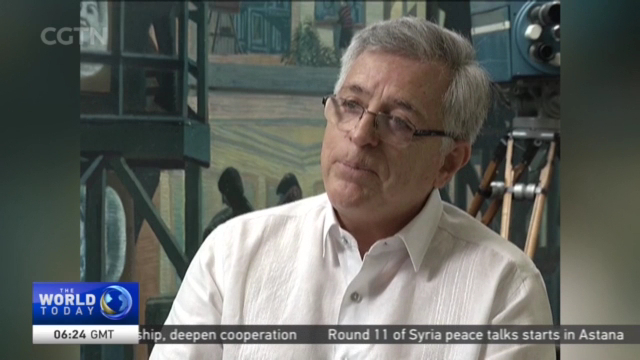
14:55, 29-Nov-2018
Glamorous Argentina: Documentary debuts ahead of Xi's visit & G20 Summit
Updated
14:47, 02-Dec-2018
03:12

Our correspondent caught up with Miguel Pereira, the president of Argentine Radio and Television, to hear his views on the two sides media cooperation.
DONG QIAN CCTV REPORTER "Mr. President, have we ever seen a programme of this nature before?"
MIGUEL PEREIRA PRESIDENT, ARGENTINE RADIO AND TELEVISION "No, nothing, never. For us, it is historical, because it is the very first time that we have done a co-production project. This TV station was built in 1978, when we hosted the World Cup in Argentina. And that year, Chinese people saw the World Cup for the first time on their televisions. And that World Cup was won by Argentina. So Chinese people have this idea that Argentina is truly a football powerhouse and champion. So today, when I visit China, people ask me about Messi. They know about different Argentine players. They buy Argentina football shirts. And they even cheer for Argentina during the World Cup. So there is a strong connection. I say this would be an ideal instrument, through which our people could better know each other. You could show what Chinese people are like to the Argentinian audience, and vice versa. The main body of our programs was produced through images provided by CCTV."
DONG QIAN CCTV REPORTER "You can ask for whatever support you need from CCTV?"
MIGUEL PEREIRA PRESIDENT, ARGENTINE RADIO AND TELEVISION "Absolutely. We did that. We did that even before we shot our part. We knew that we could count on CCTV for everything we needed."
DONG QIAN CCTV REPORTER "So Mr. President, do you think ordinary people in Argentina want to know more about China?"
MIGUEL PEREIRA PRESIDENT, ARGENTINE RADIO AND TELEVISION "Yes, now China is a major influencer around the world, in world affairs. Modern China is made up of big cities, new technologies, the Belt and Road Initiative. China has opened up to the world, and this has created wealth for China and has helped most of the poor people to come out of poverty. So that is very impressive to see, only in 40 years time, you have done these incredible things. So here, we don't often hear about China or see TV programs from China. Now we have a new partner. We can do business. Not only business, but to know each other culturally, to produce TV programs together. It's a much better experience. I think even in the strategic sense it's very useful for Argentina, our relationship with China."

SITEMAP
Copyright © 2018 CGTN. Beijing ICP prepared NO.16065310-3
Copyright © 2018 CGTN. Beijing ICP prepared NO.16065310-3